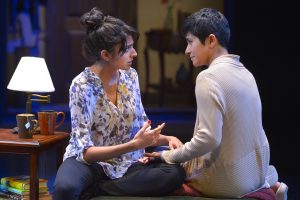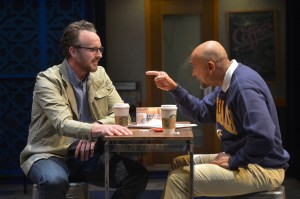From Islam to Atlanta: The Who & the What at La Jolla Playhouse
Two 20-something women, sisters it seems, gossip as one of them chops veggies for dinner. It’s the usual talk of boys and Dad and whatever, maybe a bit naughty as the subject of anal sex gets kidded around, but nothing really threatening. Safe, comfortable sitcom land.
Except… The conversation darkens. The older sister, nun-like in her severe intensity, is resolutely not thinking about the guy her father forbade her to marry. And the younger girl isn’t just dealing with the reverse side of the sex menu, she’s working to remain a technical virgin.
Oh, yeah. Ayad Akhtar’s The Who & the What, now premiering at the La Jolla Playhouse, is a family drama about the generational pressures on immigrants in America, true. But these are Islamic immigrants.

Meera Rohit Kmbhan, left, and Monika Jolly in the La Jolla Playhouse The Who & the What. Kevin Berne Photo
The American theatre is waist-deep in such plays, from Abie’s Irish Rose to Fiddler on the Roof. August Wilson, David Henry Hwang, Tennessee Williams and scores of others have contributed to a rich and varied trove of cultural assimilation_ ethnic, national, regional, religious, economic, political – with results from the hilarious to the heart-breaking.
But contemporary Islam is a special case: a religion that condones suicide bombers and sexual mutilation of girls, fanatical intolerance of other creeds and barbaric enforcement of its own. This probably doesn’t align with the religionists’s views of themselves but it certainly is the way, in recent decades, that the rest of the world has come to see Muslims.
So, a play about a Muslim family adjusting to like in the USA? By all means. Bring it on.
But consider working in some more serious sphere than a Neil Simon dessert of loving laughter and sentimental healing. There are just too many on-going fatwas for that to work.
This play is set in contemporary Atlanta. The widower father has worked his way up from taxi-driver to owner of the fleet by hard work and endless enthusiasm. The older daughter came home from Harvard Law three years earlier trailing a smitten Irish-Catholic classmate who asked the father for her hand. (“Just imagine!” is Dad’s attitude.) When she acquiesced to his ban on the marriage, she retired to her room to write The Novel, about which she will share no details. And the younger sister, vaguely involved in life as she longs for the marriage that probably can’t happen until the older sister weds, mostly moons over guys.
The father feels a duty to provide a husband even though he protests that he’s not talking about an “arranged marriage.” Instead, he sighs her up for computer dating and plays her role online. Most of the results he soon rejects but at last, he’s ready to bring her into the scheme.
Instead of just telling him to butt out, and making it stick, she finally agrees reluctantly to meet this guy – a nondescript beanpole of serious mein whose Marxist parents raised him in an all-black neighborhood who probably is a Muslim father’s dream. Not only is he a recent convert to the faith who runs a homeless center at the mosque, he’s also white. And uncomfortable with the notice this attracts.
At dinner, though they trade egghead Islamic shoptalk, she’s rude and blunt, a determined non-starter. But he does have a way of deflating pouts. And not only does he earn a return bout but they actually discuss her novel, leading to the best line in the show:
“What’s it about?”
“Gender politics.”
(Pause) “And then what happens?”
Back home, passing through on her way to bed, the daughter has nothing to say about the evening until she stops at her door, turns and says to her father: “Thank you,” setting off a frenzy of relieved celebration.
Much anguish ensues. The book turns out to be a new interpretation of stories about the Prophet, written in a way that literalists could readily consider pornographic. “In Pakistan, you could be killed for this!” hisses the father. What it really represents is an anguished attempt by honed intellects at rationalizing the religion that dictates their repression.
Years creep past, with arguments, accusations, insults, marriages, desertions and all the stuff of life. Ultimately, the daughter character stands down center and narrates the rest of the story as the others watch, impassively. And it becomes obvious that nothing much is going to change.
Sincerity soaks this play. Everybody is trying to do the right thing and somehow balance teaching with reality. But it’s not made clear that the rewards justify the labor. The who that they are resists the what they must seem.
The best thing about the La Jolla Playhouse production is the spirited ethnic music assembled by Jill BC Du Boff, which invigorates the scene changes of Jack Magaw’s vast set, roomy enough for battle scenes but not very Atlanta. Elisa Benzoni’s costumes are off the rack of a respectable resale shop and Jaymi Lee Smith has more lighting equipment that effects in evidence.
Director Kimberly Senior has staged the play in a straightforward manner, allowing room for the actors to spread out their duets and trios. The most effective character is the boy friend, played by Kai Lennox with a dogged sweetness that suggests the character’s complex life journey is nowhere near ended. Monika Jolly makes the elder sister more dour and fatalistic than necessary, bringing so much repressed intelligence to the role that there needs to be more examination why she doesn’t just flee this scene rather than wrestle it so stubbornly.
Bernard White is expansive and engulfing as the father, making the story work with deft blend of retro and resilience. And Meera Rohit Kumbhani vibrates with alternating frustration and resignation.
There’s no suggestion here that Islam is going to soil a new home or, indeed, make much of an impact at all. And that’s fine with me. These, my new fellow citizens, should take the time they need to work out their situation.
But I am reminded, when pondering that religion itself, of a line by Sholem Aleichem, famously adapted (and quoted here from memory) for Fiddler on the Roof:
“Rabbi, is there a blessing even for the Czar?”
“Yes! (chants) God bless and keep the Czar… (pointing) faaaaaar away.”
[box] Continuing at 7:30 p.m. Tuesdays and Wednesdays, 8 p.m. Thursdays-Saturdays, 2 p.m. Saturdays and 2 and 7 p.m. Sundays through March 9, 2014, in the Potiker Theatre.[/box]

Welton Jones has been following entertainment and the arts around for years, writing about them. Thirty-five of those years were spent at the UNION-TRIBUNE, the last decade was with SANDIEGO.COM.



